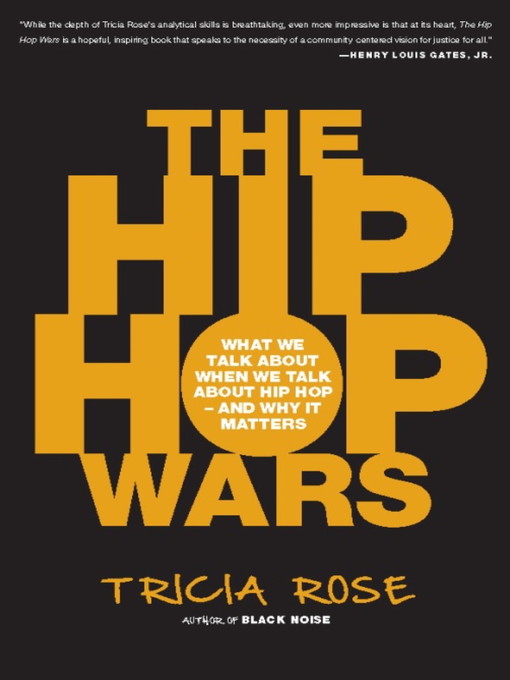The Hip Hop Wars
What We Talk About When We Talk About Hip Hop—and Why It Matters
Hip hop is a distinctive form of black art in America-from Tupac to the Pulitzer Prize-winning Kendrick Lamar, hip hop has long given voice to the African American experience. As scholar and cultural critic Tricia Rose argues, hip hop, in fact, has become one of the primary ways we talk about race in the United States.
But hip hop is in crisis. For years, the most commercially successful hip hop has become increasingly saturated with caricatures of black gangstas, thugs, pimps, and hos. This both represents and feeds a problem in black American culture. Or does it? In The Hip-Hop Wars, Rose explores the most crucial issues underlying the polarized claims on each side of the debate: Does hip hop cause violence, or merely reflect a violent ghetto culture? Is hip hop sexist, or are its detractors simply anti-sex? Does the portrayal of black culture in hip hop undermine black advancement?
A potent exploration of a divisive and important subject, The Hip Hop Wars concludes with a call for the regalvanization of the progressive and creative heart of hip hop. What Rose calls for is not a sanitized vision of the form, but one that more accurately reflects a much richer space of culture, politics, anger, and yes, sex, than the current ubiquitous images in sound and video currently provide.
-
Creators
-
Publisher
-
Release date
December 2, 2008 -
Formats
-
Kindle Book
-
OverDrive Read
- ISBN: 9780786727193
-
EPUB ebook
- ISBN: 9780786727193
- File size: 487 KB
-
-
Languages
- English
-
Reviews
-
Library Journal
November 15, 2008
Renowned cultural critic Rose (Africana studies, Brown Univ.; "Black Noise: Rap Music and Black Culture in Contemporary America") ventures again into the world of hip-hop and produces another work that should challenge common feelings about the subject. In the first section of the book, "Hip Hop's Critics," she disputes several long-standing arguments made by the detractors of the genre. Rose then changes tack completely in the second section, "Hip Hop's Defenders," arguing against several of the platitudes often voiced by those standing up for it. This balance adds to the credibility of the book, but it's Rose's convincing arguments and challenges of assumptions that make this an important title. She attempts to bring both sides together in the final section, but it's easy to imagine her cries falling on deaf ears. In fact, the biggest problem with the book is that its challenging stance and lecturing tone aren't likely to attract the number of readers on both sides of the argument who would most benefit from Rose's analyses. This title definitely deserves readers; recommended for all music and culture collections.Craig Shufelt, Fort McMurray P.L., Alta.Copyright 2008 Library Journal, LLC Used with permission.
-
Formats
- Kindle Book
- OverDrive Read
- EPUB ebook
subjects
Languages
- English
Loading
Why is availability limited?
×Availability can change throughout the month based on the library's budget. You can still place a hold on the title, and your hold will be automatically filled as soon as the title is available again.
The Kindle Book format for this title is not supported on:
×Read-along ebook
×The OverDrive Read format of this ebook has professional narration that plays while you read in your browser. Learn more here.

